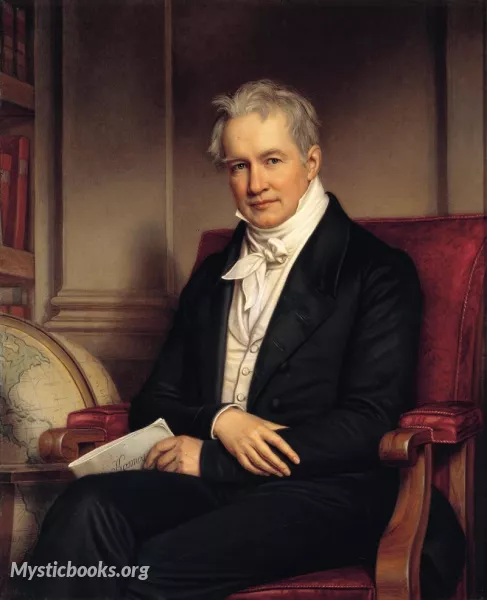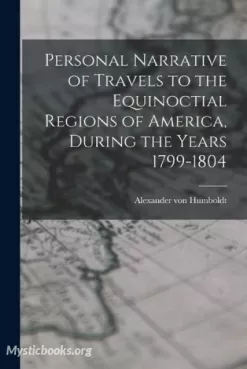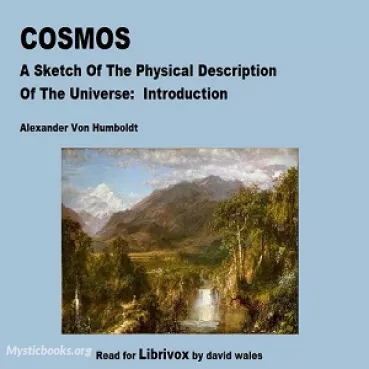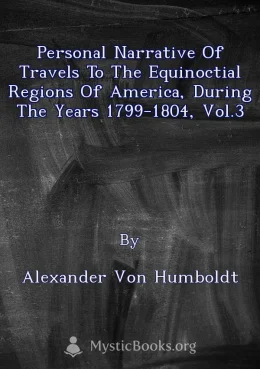
Timeline
Title
Country/Nationality
Alexander von Humboldt
Alexander von Humboldt (14 September 1769 – 6 May 1859) was a German polymath, geographer, naturalist, explorer, and proponent of Romantic philosophy and science. He was the younger brother of Wilhelm von Humboldt, the Prussian minister, philosopher, and linguist. Humboldt's quantitative work on botanical geography laid the foundation for the field of biogeography, while his advocacy of long-term systematic geophysical measurement pioneered modern geomagnetic and meteorological monitoring.
Principles
Humboldt was a proponent of the unity of nature, the idea that all aspects of the natural world are interconnected. He believed that it was important to study the Earth as a whole system, and that knowledge of one aspect of the natural world could help us to understand other aspects.
Humboldt was also a proponent of the scientific method. He believed that scientists should collect data and observations carefully, and then use this data to develop theories and hypotheses. He also believed that it was important to test theories and hypotheses through experimentation and observation.
Notable Works
Humboldt's most famous work is Personal Narrative of Travels to the Equinoctial Regions of the New Continent, During the Years 1799–1804 (1814–1829). This seven-volume work is a detailed account of his five-year expedition to South America, during which he collected a vast amount of data on the region's geography, climate, plants, and animals.
Other notable works by Humboldt include:
- Cosmos: A Sketch of the Physical Description of the Universe (1845–1862): This five-volume work is a comprehensive survey of the natural world, covering topics such as astronomy, geology, geography, and biology.
- A Political Essay on the Kingdom of New Spain (1811): This work is a detailed analysis of the social and political conditions of New Spain (modern-day Mexico) on the eve of its independence.
- Views of Nature (1807): This work is a collection of essays on topics such as the unity of nature, the importance of scientific observation, and the relationship between science and the arts.
Philosophy
Humboldt's philosophy was influenced by the Romantic movement, which emphasized the importance of individual experience and the interconnectedness of all things. He believed that science and the arts could be used to understand the natural world and to create a better society.
Humboldt's philosophy is evident in his writings, which are full of lyrical descriptions of nature and his own personal reflections on his experiences. He was also a strong advocate for education and social justice.
Death and Legacy
Humboldt died on 6 May 1859, at the age of 89. He is remembered as one of the most important and influential scientists of the 19th century. His work laid the foundation for many modern scientific disciplines, including biogeography, climatology, and geophysics.
Humboldt's legacy is also felt in his writings, which continue to inspire scientists and artists today. He is remembered for his dedication to the pursuit of knowledge, his commitment to scientific accuracy, and his poetic descriptions of the natural world.
Interesting Facts
- Humboldt was a prolific writer, publishing over 300 books and articles during his lifetime.
- Humboldt was a friend and correspondent of many famous people, including Johann Wolfgang von Goethe, Friedrich Schiller, and Thomas Jefferson.
- Humboldt was a strong advocate for the abolition of slavery and the humane treatment of indigenous peoples.
- Humboldt's name is commemorated in many places around the world, including the Humboldt Current, the Humboldt Mountains, and the Humboldt University of Berlin.
Conclusion
Alexander von Humboldt was a towering figure in the history of science. His work laid the foundation for many modern scientific disciplines, and his writings continue to inspire scientists and artists today. He is remembered for his dedication to the pursuit of knowledge, his commitment to scientific accuracy, and his poetic descriptions of the natural world.
Books by Alexander von Humboldt

Personal Narrative of Travels to the Equinoctial Regions of America, During the Years 1799-1804, Vol.2
What if you could travel back in time and explore the uncharted wilderness of South America with one of the greatest scientists of the 19th century? In Volume 2 of his Personal Narrative of Travels to the Equinoctial Regions of America, Alexander vo...

Cosmos: A Sketch of a Physical Description of The Universe: Introduction
Embark on a captivating journey through the cosmos with Alexander von Humboldt's groundbreaking work, 'Cosmos: A Sketch of a Physical Description of The Universe.' This remarkable book, introduced by the esteemed naturalist himself, offers a comprehe...

Personal Narrative of Travels to the Equinoctial Regions of America, During the Years 1799-1804, Vol.1
Embark on an exhilarating journey through uncharted realms with Alexander von Humboldt's enthralling "Personal Narrative of Travels to the Equinoctial Regions of America, During the Years 1799-1804, Vol.1." In this captivating memoir, Humboldt, a vis...

Personal Narrative of Travels to the Equinoctial Regions of America, During the Years 1799-1804, Vol.3
This book is the third volume of Alexander von Humboldt's "Personal Narrative of Travels to the Equinoctial Regions of America." It describes his travels with the botanist Aimé Bonpland in South and Central America, and the Caribbean. They start at A...